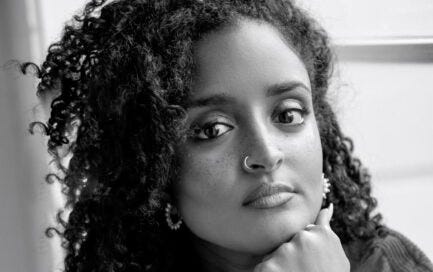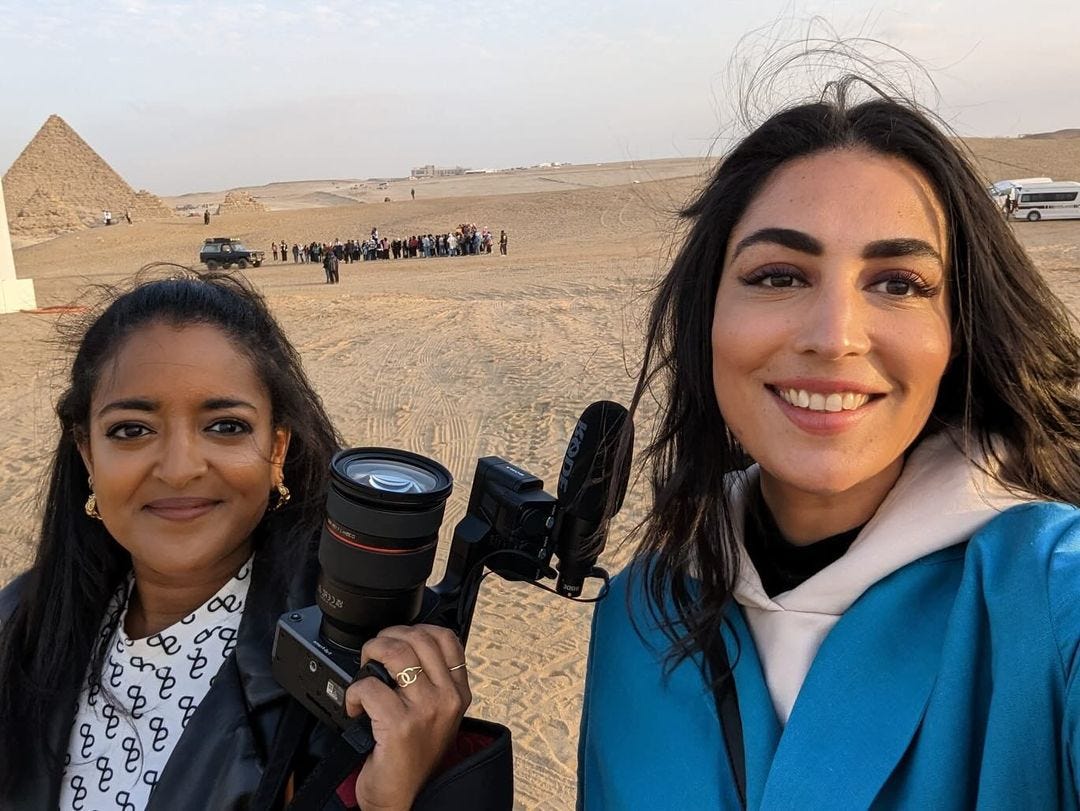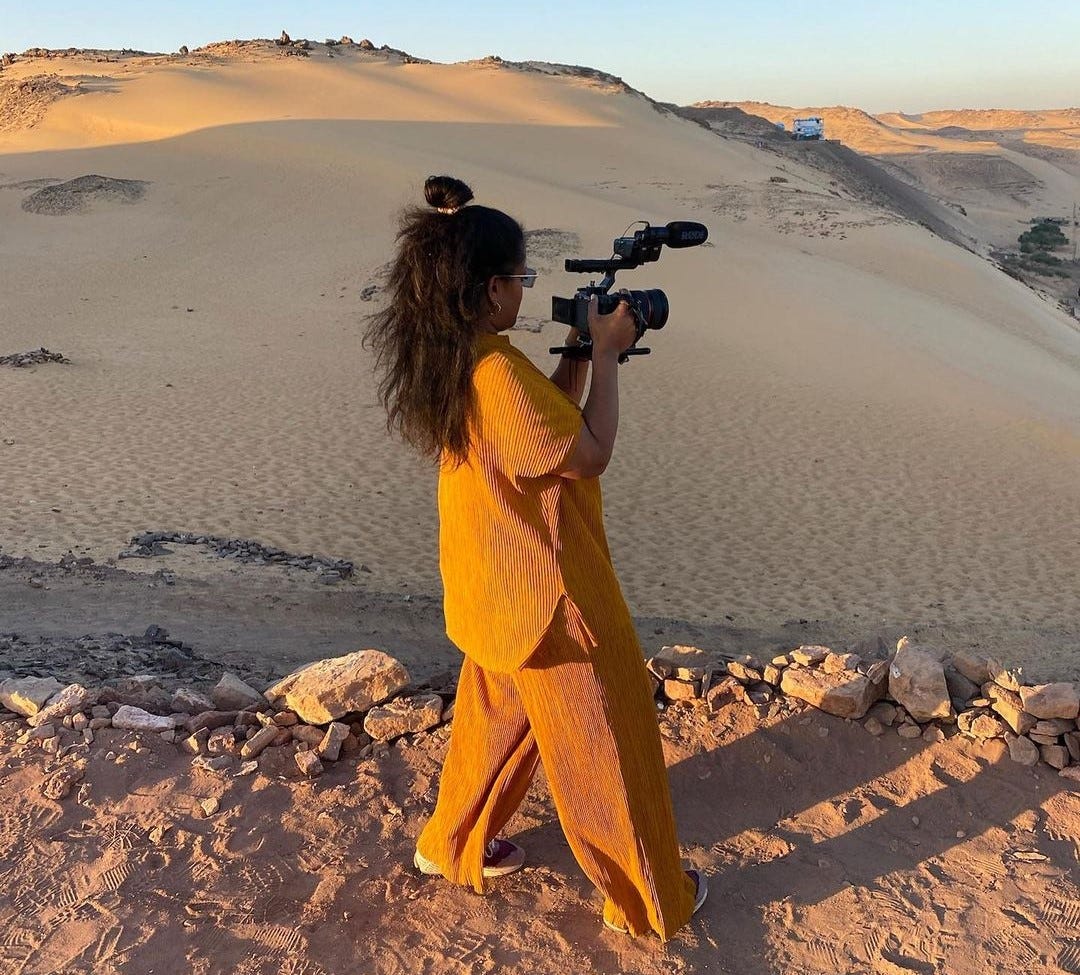Broadcasting: Basma Khalifa
Sudanese filmmaker, writer and director Basma Khalifa talks about how to best serve the SWANA diaspora through storytelling, the cost of creativity and feeling like you're on the wrong path.
Sitting opposite Basma, cross-legged in the sun in London Fields, I am struck by the feeling that I am interviewing a bit of a hero of mine. Rewind seven years; I’ve been tasked with suggesting presenters for a new factual entertainment series for CBBC. It’s an art competition show and we need judges for each segment: street art, fashion, painting, etc. Trawling the internet for inspiration, I come across a Sudanese Fashion Stylist called Basma Khalifa who has started a YouTube series in which she interviews black women about what it’s like to navigate the fashion industry. She is smart, passionate and charismatic. I am desperate to get her on the show. But, as is often the case, I am told she ‘doesn’t have enough of a following’.
Seven years later and Basma has a feature length documentary under her belt - a project for BBC 3 in which she visits her birthplace of Saudi Arabia, multiple articles in The Guardian, The Independent and The Telegraph, a directing portfolio for brands including Netflix and BBC, and a shadow directing gig on Apple TV’s Slow Horses. She’s just finished shooting a documentary, is working on her own scripted TV series, as well as multiple short films. Along with Alya Mooro, Basma launched production company Zola Studios, with the aim to provide space to tell stories from the South West Asia and North Africa region and beyond. Basma is a force to be reckoned with (which I could have told everyone years ago) and this has been one of the most fulfilling and enriching conversations I’ve had to date.
“It saddens me to say this, but I do think that there’s only so far hard work can get you in an industry like ours, particularly when you’re from a background that isn’t ‘the norm’”
When I first moved from Manchester to London, one of the things that struck me was everybody’s obsession with identity politics (which I fear I am now equally as guilty of!). Was that your experience when you came to London?
Yes! I get asked to ‘explain’ myself all day every day. I was born in Saudi Arabia and spent most of my childhood in Northern Ireland, which is where I lived until I was thirteen. London is what gave me an identity crisis. Before that, my lived experience was just my lived experience. I didn’t know it was perceived as weird that I was born in Saudi Arabia to Sudanese parents. Or that leaving Saudi at the beginning of the Gulf War to move to Northern Ireland at the tail end of the Troubles was a ‘unique’ experience. It was just my life.
Now I identify as an Afro, Arab, Muslim woman, but I add in ‘with Scottish and Northern Irish elements’. I say that because people see my face and hear my accent and they’re confused. People need to know ‘what’ you are so that they can place you in their minds. Especially in this country. If you say that you’re British but you don’t ‘look’ British, you’re met with a mixture of confusion and curiosity. We have become so accustomed to stating our entire identity, almost as if it’s as important as our name. And maybe it is. As a creative, I wonder whether we’re only allowed to create from our identity, or whether we can create from our interests?
I suppose in order to try and answer that, we need to consider how much we - as people from underrepresented backgrounds within the industry - might be perpetuating it. Whenever I introduce myself as British Egyptian, I wonder how much that influences the stories people think I am interested in.
Absolutely, I think we’ve created a bit of a target on our backs. I have a privilege which is my ability to access so many perspectives; I can talk about being black, I can talk about being Sudanese, I can talk about being Muslim. But, on the whole, I feel like brown people are expected to tell brown stories and black people are expected to tell black stories. I’m not sure that’s the same across the board. Should Martin Scorcese have directed Killers of a Flower Moon? Was that his story to bring to life? He’s a brilliant director, but I can’t help but wonder how many indigenous creatives were overlooked in favour of him. But then maybe, without him attached and the weight that carries, the film wouldn’t have been made at all?
It’s a bit of a catch-22. There aren’t enough people from certain communities who have the right experience, because they’re not given the chance to gain it. So then, when big opportunities arise, they go to that same group of privileged people. It’s a vicious cycle.
Exactly. And that’s what we’re so desperate to break with Zola. I’d love to provide a space where we can tell stories about characters from certain backgrounds, with a crew full of people who reflect those perspectives. And I think in order to do that we have to just do it, rather than waiting for somebody to offer an opportunity that might never come. My agent said something to me recently that has always stuck. We were talking about me directing something and I was saying that I don’t have experience in it so I can’t do it. And he said to me, ‘you haven’t done something until you have’.
It’s interesting to me that you said that to him because you’ve done so much already throughout your career! I’d love to know how you went from a Fashion Stylist to a filmmaker.
I actually always wanted to work in documentaries. Fashion was my secondary interest, and - for some reason - I thought it would be easier to get into than TV. I saw a course in Fashion Business at Glasgow Caledonian University and I figured that my parents would be happy if I graduated from a business school. I’d always been interested in fashion. My grandfather was a tailor and my mum makes clothes. I started off in fashion PR, before going into fashion styling and editorial. I was on these eleven month contracts which they used to put us on so that they didn’t have to give us any legal rights. I spent my days lugging suitcases around and steaming clothes, earning very little money doing so. One of the last shoots I did was in Miami. I was assisting a stylist and I had to carry twelve suitcases by myself through Heathrow Airport. Tell me why a swimsuit shoot needs twelve suitcases?! I remember looking around and thinking that at one point this would have been my dream. But it wasn’t my dream anymore, and it wasn’t a sustainable career. So I left.
How did you go from a beach in Miami to making your debut documentary, Inside the Real Saudi Arabia: Why I Had to Leave?
Initially, I wanted to make a documentary in fashion. I was messaging people on LinkedIn whose work I admired and I managed to get a meeting with Miki Mistrati, who ended up being my Exec Producer on the documentary. He’s the one who pushed me to go to Saudi Arabia. I didn’t want to, but the more I was telling him about the fact I hadn’t been back since I was three, the more he was like - this is the story! He took a complete punt on me. I owe him my career. We were pitching the idea for so long and we kept coming up against the same questions; Why her? Why now? We were waiting for ages for a response. And then, at an industry event, I managed to corner the BBC Three commissioner and I was like, ‘have you read our pitch yet?’ And he was like, ‘dude, I get 700 ideas a month’. I made him promise to read it and he greenlit the documentary less than three weeks later. The rest is history. It was an amazing experience.
If that isn’t a lesson in going after what you want, then I don’t know what is! Have you always been such a go-getter?
I used to be, definitely. I look back at myself and I admire that person so much. I wouldn’t take no for an answer. I remember when I stopped calling myself a fashion assistant and instead saying I was a stylist (because that is what I was doing) and one of my assistant friends was like, ‘what are you talking about? We’re assistants’. And I was like, ‘well, who’s going to graduate us? No-one is promoting us - we have to promote ourselves’. I was the same with the documentary. I just decided that I was a presenter and started my YouTube channel. I wish I’d carried on because I’d be raking it in by now!
But - and it saddens me to say this - I do think that there’s only so far hard work can get you in an industry like ours, particularly when you’re from a background that isn’t ‘the norm’. I really struggled to get a second commission, despite being nominated for the Newcomer Of The Year award at the Edinburgh TV Festival and the doc getting over 10 million views. I would keep pitching different ideas but I’d be met with a response that was basically like, ‘well, we could get someone else to do it’. I even had Louis Theroux as my mentor for a while and I still wasn’t able to get anywhere. So, I attended the University of YouTube, as I like to say, and - with the help of some very patient friends - taught myself how to use a camera. I love the projects I am working on and I am really proud of them, but I still feel sad sometimes. I really really wanted to be a presenter. I wanted to be like Hind Hassan or a female Reggie Yates. I suppose it just wasn’t aligned.
I think you’re being hard on yourself. So many people, myself included, would look at the work you’ve done and continue to do with such awe and admiration. Do you feel proud of yourself?
I am proud of the tenacity that has got me to where I am, but sometimes I envy people who stuck to one profession and perfected it. I’d love to go into this next chapter of my life perfecting the skills I have, rather than constantly feeling like I need to upskill in order to move forward. I always think that there’s more you can do, but I don’t know how much I have to give to doing more. I feel a bit exhausted by it all. This is the first year that I think being freelance is catching up with me and I am seeing less and less of the benefits. It doesn’t feel like there is anything ‘free’ about being freelance right now. So, whether I feel proud of myself is a hard question to answer. Do I think I’ve done some incredible things? Yes. Do I feel fulfilled? In certain aspects, yes, but do I feel like I'm necessarily on a career path? I don’t know.
My mum was an Egyptologist before she moved to the UK with no ‘career path’. She spent the next ten years following her interests and saying yes to opportunities. In that time, she worked in clinical research, completed two MA degrees and a PHD, before starting a Doctorate in Clinical Psychology. She’s now a Consultant Clinical Psychologist. I say that partly to show off about my mum, but also because I think sometimes we don’t have the necessary context yet to realise that all paths are paths, even if they don’t feel like they are at the time.
That’s so inspiring. I think that’s true. All the tools we pick up along the way are there to be used. For me, I think it’s about recognising when to use which tools. I feel really excited about the work we’re doing with Zola. I’ve just finished shooting my first feature length documentary centred around two sisters in Cairo, and I’ve made a short film about the rituals of henna which I can’t wait to share with the world. The process has taught me that - even if I’m not presenting in front of the camera - it’s still my lens that the stories are being told through. As a director, it’s me shooting the content. I hate the technical element and I’m still not very good at it, but there is something really special about holding the camera, particularly as a woman. You feel so in control of the story in a way I’d never really thought about. And it turns out I’m pretty good at it!
What else do you think you’re good at?
I think I’m good at being an empathetic storyteller. I think some of my best work hasn’t been the big flashy stuff, but instead the really succinct storytelling, whether that’s been for an article or something I’ve written on my Instagram. I think I have a way with words. My grandfather used to call me ‘Basma el faylasufa’, which means Basma the philosopher. I want to get better at having more conviction in myself. I have a lot of thoughts and points of view, but sometimes I feel as though I shouldn’t always share them.
I’m also starting to question how much of myself I want to give away in the name of creativity. The more I get to know myself, the less I have the desire to be loud, but I’m wondering if that’s even possible. I think men are allowed to be quiet and successful, but I don’t think women get that same privilege. I want to get better at working smarter. I don’t want to put all my money into things. The short film rinsed me dry because I couldn’t get funding for it. I know when it comes out it’ll make a stir, but it killed me a little bit to get there. I’m sick of feeling like I need to sell out in order to tell our stories. Should creativity come at that cost? I hope that, in ten years time, we can look back and answer that question with a solid no, but - for now - I guess we just have to keep having these conversations.







